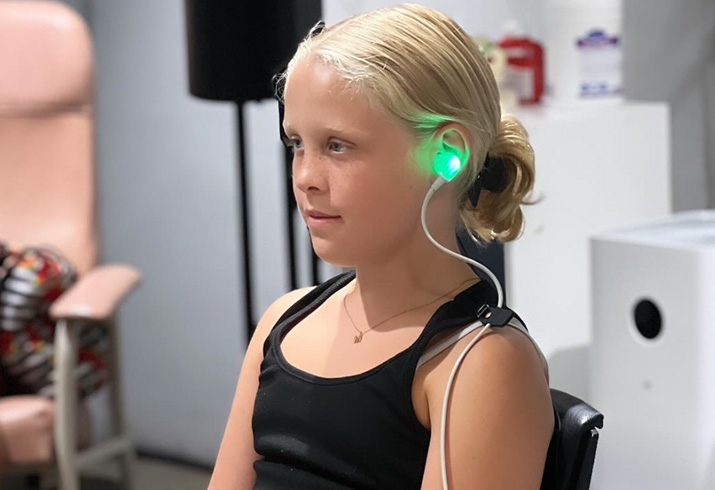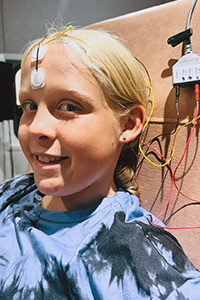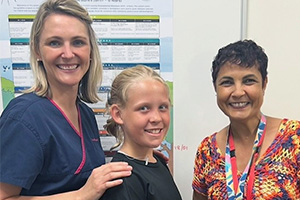Virtual cochlear-implant care helps patients like Matilda hear better from home
 Matilda doing her auditory therapy
Matilda doing her auditory therapy
13-year-old Matilda is grateful to hear well at school thanks to her cochlear implant, after spending several years with hearing loss and falling behind in her schoolwork.
Matilda’s mum, Samantha, said a cochlear implant was ‘life changing’ for her daughter, as was the remote therapy she subsequently received through Fiona Stanley Hospital (FSH) that allowed Matilda to continue attending school rather than travelling over an hour to the hospital for each appointment.
A new virtual-clinic and auditory training program run out of FSH is enabling patients like Matilda to conveniently access hearing rehabilitation from the comfort of home.
Initially aiming to improve care, accessibility, and outcomes for older patients, and now expanding for those requiring remote services with cochlear implants (CI), the program and clinic are part of a new FSH research study assessing if digitising CI rehabilitation may offer a more convenient and sustainable model of care.
FSH Head of Audiology Department, A/Prof Dayse Tavora-Vieira, said routine hospital clinic visits for CI programming left little time for crucial hearing exercises that benefit patients, and some patients struggled to attend extra appointments.
“Remote rehabilitation will enable our patients to access tailored therapy without travel or mobility barriers, and complete structured training at their own pace,” A/Prof Tavora-Vieira said.
“The study hopes to empower CI users to practise at home, consolidating clinic work in their daily environment and improving their hearing outcomes and quality-of-life, and lowered listening effort, which could be transformational.

Samantha said she cannot thank Fiona Stanley Hospital enough for the remote hearing service provided to Matilda.
“Matilda’s confidence has grown since she’s been able to hear well and catch up at school, and the remote service really assisted her to not miss any more school lessons.”
A/Prof Tavora-Vieira along with her study research team; Audiologist, Dr Caris Bogdanov and Dr Andre Wedeind, Ear, Nose and Throat surgeons Prof Peter Friedland and Dr Aanand Acharya as well as Allied Health director, A/Prof Vinicius Cavalheri, hopes the study results will validate a replicable, cost-effective tele-audiology model for state-wide expansion of the model of care.
“Additionally, reducing demand for in-person appointments allows audiologists to be available to treat more patients,” A/Prof Tavora-Vieira said.
The Western Australian Future Health Research & Innovation Fund funded the project with the research pilot and evaluation phases expecting completion by June 2027.
Photo: Matilda (centre) pictured with Paediatric and Implant Specialist Karin van der Merwe (L) and A/Prof Tavora-Vieira (R).
Keep up to date with our news and achievements
Find out more on Facebook (external site) or LinkedIn (external site)


